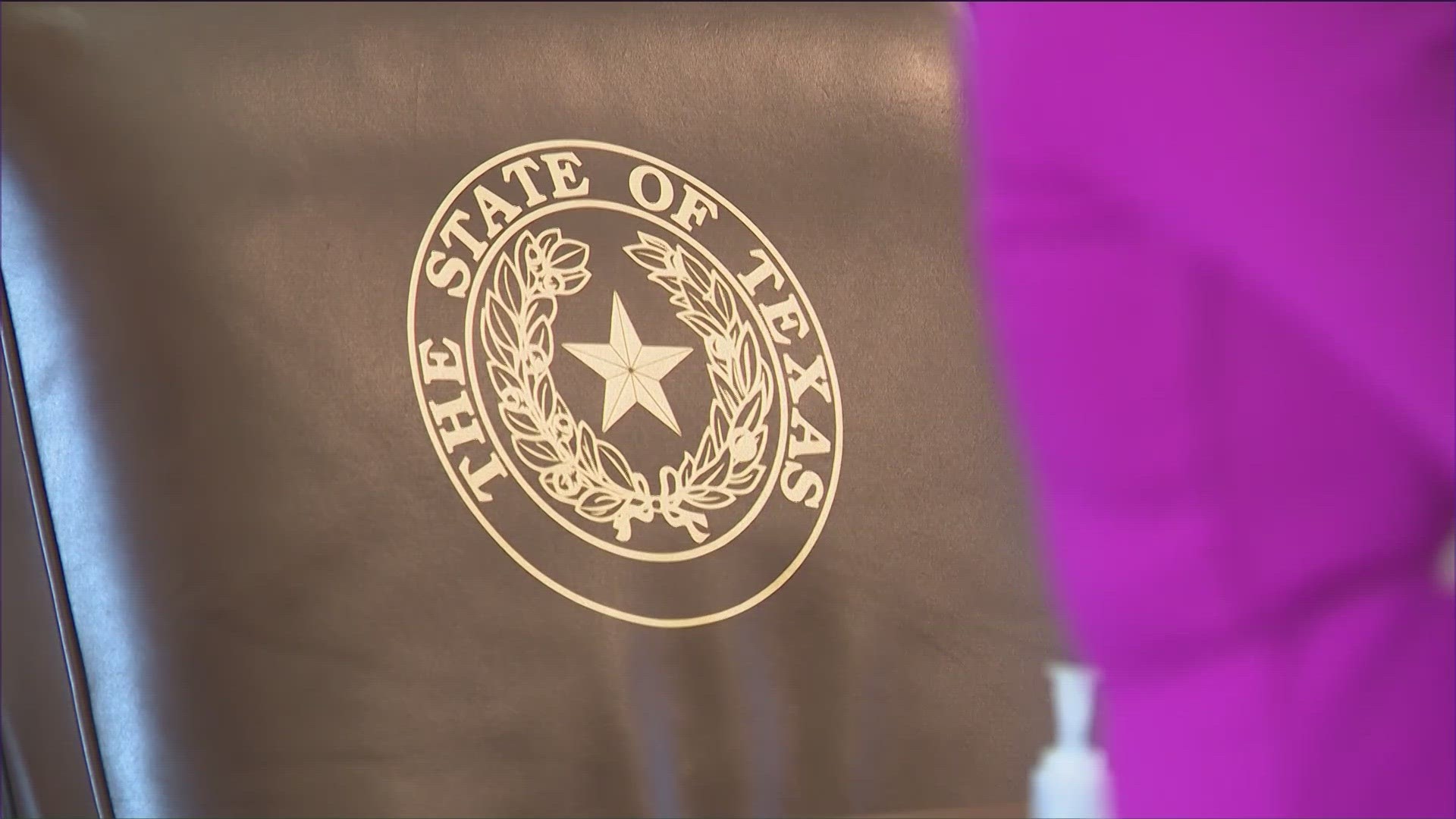AUSTIN, Texas — On the floor of the Texas House of Representatives Wednesday were pops of pink. But not everyone was on the same page about why they chose to wear the color.
While Republican representatives wore pink in support of a controversial bill anticipated on the floor, some Democratic representatives could also be seen in pink and blue to show their opposition to the bill and in support of the transgender community.
In the gallery, some could be seen wearing red T-shirts that said, “Save Women’s Sports.” The shirts are a familiar sight on days the Legislature tackles LGBTQ+-related bills. Other shirts in the gallery bore the same colors and text saying, “Save Texas Kids.”
On Wednesday, the House brought Senate Bill 15 to the floor for debate and a vote. The bill, authored by State Sen. Mayes Middleton (R-Galveston), would require collegiate athletes to compete according to the sex assigned at their birth.
Upon consideration in the House, a point of order – a procedural line of questioning raised usually in attempt to stall or kill a bill – was called by Democratic State Rep. Erin Zwiener. It was withdrawn, but she later returned to call a second point of order.
Zwiener argued the background and purpose of SB 15 is misleading. The second, and eventually third, point of order called by Zwiener was also withdrawn.
State Rep. John Bucy III attempted to make an amendment to SB 15 that would remove the enactment clause, meaning the bill would immediately die. Responses to the amendment caused several fiery correspondences between Bucy and a couple of Republican lawmakers, and Bucy's amendment ultimately failed.
State Rep. Jon Rosenthal also brought forth an amendment that would exclude intersex people from the bill. That amendment failed.
SB 15 passed through the Texas House's second reading with 93 ayes, 49 nays, three present not voting and four absent.
State Rep. Valoree Swanson, who is carrying the Senate bill through the lower chamber, said the bill is about "fairness" and not about "restricting anybody's opportunity to play on a team."
SB 15 is one of Lt. Gov. Dan Patrick’s priorities this session. Gov. Greg Abbott also backs the legislation.
Alongside Patrick, former National Collegiate Athletic Association (NCAA) championship swimmer Riley Gaines, who is from Tennessee and swam for the University of Kentucky, has rallied at the Texas Capitol for the Save Women’s Sports Act. Gaines has often shared her story of competing against a transgender woman, Lia Thomas.
Gaines and Thomas once tied in a collegiate swimming race. Gaines said despite tying for first place, the NCAA gave the trophy to Thomas. She said she was told it was for "photo opportunities."
"I was waiting for a coach or a parent or someone within the NCAA, someone who was supposed to be protecting us to protect us," Gaines said at a rally at the Texas Capitol in March. "But then it hit me – if we as female athletes aren’t willing to speak up for ourselves, how can we expect someone else to stick up for us?"
Gaines made it clear she did not feel it was fair that Thomas got to compete against biological women. She said she thought the NCAA would "see it for what it is," that Thomas ranked in the 460th range in collegiate swimming as a man, then found herself on the leader board as a transgender woman competing in women's swimming.
She said she thought the NCAA would intervene, but according to her, it did not.
In a press release released ahead of Wednesday’s SB 15 debate, Gaines said “adding college to the protection of girls in sports is crucial to make sure women's safety, privacy and equal opportunities are not lost in sports.”
Mary Elizabeth Castle, director of government relations for Texas Values, said in that same press release that it’s time the Texas House fully protect women athletes throughout their athletic and educational careers.
“It is very clear that allowing men like Lia Thomas to literally take the trophy out of the hands of lifelong hardworking athletes like Riley Gaines is unfair and an injustice,” Castle said. "Texas can make sure unfair competition does not happen in our state!"
SB 15 contradicts guidance from the NCAA, which, since 2010, has allowed transgender student athletes to compete on teams that match their gender identity. However, the organization approved a new policy in the fall of 2020 that requires transgender student athletes to prove they meet certain sport-specific provisions for testosterone levels.
KVUE's news partners at the Austin-American Statesman previously asked every four-year public university in Texas that participates in NCAA-sanctioned sports if they ever had a transgender athlete compete. None said yes.
Thirty-four openly transgender athletes nationwide have competed in college sports, including at community colleges and junior colleges, in the past decade, according to a limited list by Outsports. The list does not include any athletes who competed or are competing while attending a university in Texas.
SB 15 needs one more vote in the House before it goes back for final approval in the Senate. After that, it can head to the governor's desk.

